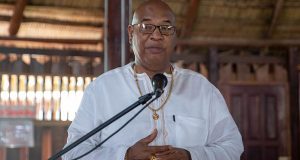BASSETERRE, St. Kitts and Nevis, May 5, 2020 (CMC) – Governor of the Eastern Caribbean Central Bank (ECCB), Timothy Antoine, says there is likely to be a 20 percent economic contraction, across the sub-region, as the coronavirus (COVID-19) pandemic is seriously affecting the economies of the member countries.
The ECCB serves as the central bank for Antigua and Barbuda, Dominica, Grenada, St. Lucia, St. Vincent and the Grenadines, St. Kitts-Nevis and Montserrat.
Speaking on the topic, “Financial Prudence in light of the Economic Trajectory”, as part of the government’s COVID-19 briefing, over the last weekend, Antoine said, the latest numbers indicate that the contraction “may be somewhere in the vicinity of 10 to 20 percent, and that, of course, is an average, across the currency union”.
“Clearly one of the biggest drivers of that is the tourism sector, which, as you know, is now shut. It is our lead sector, foreign exchange, jobs, government revenue, our tourism sector has ground to a halt,” said Antoine, adding “at this moment, the biggest question is when will tourism rebound”.
“Truth be told, we do not really know. Of course, we hope it will be sooner, rather than later, but in all likelihood, the economic damage of this pandemic will outlast the pandemic and, in the absence of a vaccine, we are likely to have a protracted recovery process, so that 12 to 18 months do not appear, in my estimation, to be unreasonable at this stage,” he said.
The Central Bank Governor said, in terms of employment, the sub-region has seen a “sharp rise in unemployment” and, in at least two countries, which he did not name, “I am now advised that unemployment is approaching 50 percent”.
Antoine said that countries in the sub-region were “seeing revenues plummeting, by as much as 50 percent (and), in some cases, it is actually more”, adding that one country is close to 75 percent.
“Cleary revenues are down. Hotels are closed, jobs are being lost, and businesses have been shut,” he said, noting also that remittances, “which have been resilient, over time, and a very important part of our economy and our coping mechanism”, are dwindling, as a result of the pandemic.
He said job losses in the United States, in particular, will result in an “adverse impact on remittances in our currency union”.
“In fact, we may see a phenomenon, we observed after the global financial crisis, when we saw reverse remittances, that is to say, people in our currency union were sending money to people in the United States and the UK.”
Antoine said, in terms of foreign direct investments (FDI), “there will be a decline, at least in the short term, and that may also include the Citizenship by Investment Programme (CBI)”, through which foreign investors are granted citizenship of countries, in return for making a substantial investment in their socio-economic development.
“Some of the prospective applicants have been affected by the financial markets, which, of course, are in turmoil, and by various developments across the world,” Antoine said, noting that he has heard from “one or two countries that they are continuing to feel interest in the program”.
He said one legacy of the pandemic, he hopes, will be stronger health systems, across the sub-region, “because our governments have had to invest significant sums in our health systems.
“Therefore, a legacy benefit would be a stronger system, which then enhances the value proposition for our countries, in respect of Citizenship by Investment, because going forward, people need to know that they will be safe, that their health will be looked after.”
Antoine said that the sub-region could also benefit from the low oil prices on the global markets, and with the member countries all being oil-importing nations, “we are paying less to import oil”.
He said the sub-region spends “significant sums of money”, every year, importing the commodity.
“As the saying goes, a dollar saved is a dollar earned,” he added.
Antoine outlined a number of initiatives, being undertaken by the ECCB, in helping member states overcome the pandemic, and reminded the audience that, even in this dark period, there is a silver lining.
“Count your blessings. I know in this period it is easy to get discouraged and even depressed, but every day count three blessings…it will help your state of mind,” he said, reminding the audience that regional solidarity will also help the sub-region overcome the pandemic.
“Lest we forget, our countries were not expected to survive after independence…but we did not just survive, we thrived and, notwithstanding the ups and downs, overtime, our countries have been resilient, because we stuck together and we worked together,” he added.
 Pride News Canada's Leader In African Canadian & Caribbean News, Views & Lifestyle
Pride News Canada's Leader In African Canadian & Caribbean News, Views & Lifestyle





